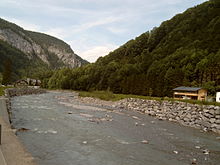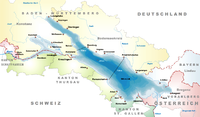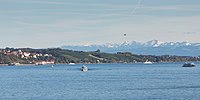
Lake Constance refers to three bodies of water on the Rhine at the northern foot of the Alps: Upper Lake Constance (Obersee), Lower Lake Constance (Untersee), and a connecting stretch of the Rhine, called the Seerhein. These waterbodies lie within the Lake Constance Basin in the Alpine Foreland through which the Rhine flows. The nearby Mindelsee is not considered part of Lake Constance. The lake is situated where Germany, Switzerland, and Austria meet. Its shorelines lie in the German states of Baden-Württemberg and Bavaria; the Swiss cantons of St. Gallen, Thurgau, and Schaffhausen; and the Austrian state of Vorarlberg. The actual locations of the country borders within the lake are disputed.
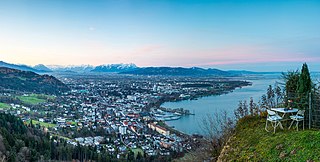
Bregenz is the capital of Vorarlberg, the westernmost state of Austria. The city lies on the east and southeast shores of Lake Constance, the third-largest freshwater lake in Central Europe, between Switzerland in the west and Germany in the northwest.

Vorarlberg is the westernmost state of Austria. It has the second-smallest geographical area after Vienna and, although it also has the second-smallest population, it is the state with the second-highest population density. Two thirds of the country are situated above 1,000m. It borders three countries: Germany, Switzerland, and Liechtenstein. The only Austrian state that shares a border with Vorarlberg is Tyrol, to the east.

Dornbirn is a city in the westernmost Austrian state of Vorarlberg. It is the administrative centre for the district of Dornbirn, which also includes the town of Hohenems, and the market town Lustenau.

The Bregenzerwald is one of the main regions in the state of Vorarlberg (Austria). It overlaps, but is not coterminous with, the Bregenz Forest Mountains, which belong to a range of the Northern Limestone Alps, specifically the northern flysch zone. It is the drainage basin of the Bregenzer Ach river.

The Alpine Rhine Valley is a glacial alpine valley, formed by the Alpine Rhine, the part of the Rhine between the confluence of the Anterior Rhine and Posterior Rhine at Reichenau and Lake Constance. It covers three countries, with sections of the river demarcating the borders between Austria and Switzerland and between Liechtenstein and Switzerland. The full length of the Alpine Rhine is 93.5 km.

The Dornbirner Ach is a 29.9 km (18.6 mi) long stream in Vorarlberg, Austria, and a tributary of Lake Constance and the Rhine, respectively. It flows through two gorges in its upper part, the Alploch Gorge and the Rappenloch Gorge.

Hard is a town in the west of the westernmost Austrian state of Vorarlberg, directly on the southern shores of Lake Constance. Hard's attractions include the Strandbad and the Grünerdamm. Hard is also known for its skatepark.

Au is a town in the Bregenz Forest in Vorarlberg (Austria).

Egg is a market town in the Bregenz Forest, in the western Austrian state of Vorarlberg, part of the district of Bregenz. It is the has the highest population of any community in the Bregenzerwald.

The Subersach is a river of Vorarlberg, Austria, a tributary of the Bregenzer Ach.

The Allgäu Alps are a mountain range in the Northern Limestone Alps, located on the Austria–Germany border, which covers parts of the German states of Bavaria and Baden-Württemberg and the Austrian states of Tyrol and Vorarlberg. The range lies directly east of Lake Constance.

Doren is a municipality in the district of Bregenz in the western Austrian state of Vorarlberg.

Sibratsgfäll is a municipality in the district of Bregenz in the Austrian state of Vorarlberg.
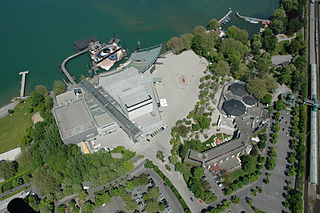
Bregenzer Festspiele is a performing arts festival which is held every July and August in Bregenz in Vorarlberg (Austria). It features a large floating stage which is situated on Lake Constance.

The Obersee, also known as Upper Lake Constance, is the much larger of the two parts of Lake Constance, the other part being the Untersee. The two parts are separated by the Bodanrück peninsula. The narrow, northwestern branch of Obersee is also called Überlinger See.

The Bregenz Forest Mountains, also the Bregenzerwald Mountains, are a range of the Northern Limestone Alps and Eastern Alps, named after the town of Bregenz. The Bregenz Forest Mountains are located entirely in the Austrian state of Vorarlberg.

The Rhine delta of Lake Constance is the river delta on the southeastern shore of Lake Constance, which the Rhine has formed in a former sea area. It lies mostly in the Austrian province of Vorarlberg, smaller areas are in the Swiss canton of St. Gallen. The two peninsulas in the lake are called Rheinspitz (west) and Rohrspitz (east).

The Roman Theatre in Bregenz, Vorarlberg, Austria, is located in the quarter of Thalbach in Bregenz. Bregenz was called Brigantium by the Romans. The theatre was excavated by archaeologists specifically in 2013 and 2019 in the name of the Vorarlberg provincial museum.


